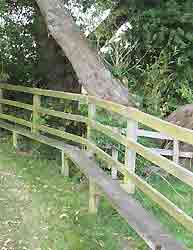

..there were chickens in the road, everywhere, but then there was no traffic. Most people kept a pig, You'd find a sty behind most houses."
Great Brickhill, two generations ago, was extremely rural, and has been described as "one big family" in the way everyone knew and looked after each other.
Electric light did not come to the village until the 1930s, mains sewerage was not installed until 1959, and even the water supply was inadequate as late as 1963. Gas did not arrive until the 1980s!
Getting around at night was difficult, there were no street lights. There was one man who put glow worms on his hat to see his way along Heath Road, when walking to the village.
Talking with people who were young in 1930s and 40s, we soon understood that they had to so a great deal of walking and cycling! Although the bus service is not exactly good these days, at least there are buses to the local schools in Aylesbury and Wing and a bus each weekday to Bletchley and Milton Keynes. There were buses to Bletchley and even to Leighton Buzzard in the past, but they were certainly no more frequent, and the children who went to the secondary schools in Bletchley and Linslade had to walk or cycle.
"If you could afford a bike you might go to the grammar school in Linslade, but most of us went to school in Queensway, Bletchley. We called it Barrel Codd's College."The Headmaster was Mr Codd and there was BCC on the front of the building, you can work out why he was called Barrell Codd!
It was the same for people who worked outside the village, one hardy cyclist (who is still a cyclist today!) rode from the village to work in Stoney Stratford and back, again, every day.
"I rode my bike to work at Bletchley depot even when I lived in Heath and Reach it was the only way of getting there. I once had a bad accident when the wheel came off going down Galley Lane Hill, I tried to wave down the Electricity van, but he would not stop. Someone in a horse and cart eventually rescued me."
"The bus service was worse than it is now. There was one bus a week on a Monday - to Bletchley. But people got what they wanted in the village. The baker sold butter and things like that, it came from Newport Pagnell. He also sold chicken feed, which came up from the mill with the flour. If you needed the doctor, he had to come to see you, there was no way of getting to him".
The bus to Leighton did not go the route you would take today, down Ivy Lane and Partridge Hill to Chelmscote and the Stoke Road. No, the main road to Leighton (and the bus) turned off down Bragenham Lane and went via Rushmere and Plantation Road, In 1965 it was decided that the lane was too overgrown for the bus to squeeze through, but a bus service to Leighton Buzzard did continue for some time after this, but using the new route.
People Did work much more locally on the farms. Some villagers worked on the electrification of the mainline from Watford to Euston in the 1960s, but to do this they had to stay away from home during the week. There were no commuters to London everyday, and Milton Keynes did not exist!
There were very few cars in the village before the 1960s. In the 1930s there were only four: one owned by Sir Everard and Lady Duncombe, the second by Mr Kielberg of Stockgrove House, the third by Mr Watson of Closefields, and it is thought the fourth belonged to Broomhill House.

But people did go out to dances in Stoke Hammond and at the Coronation Hall in Water Eaton, but they walked there. The route to Stoke Hammond down Stoke Lane past Papermill farm to Bragenham Lane. The path was much better then: this route is used by walkers today, but not by many going to a dance! Orchard Mill Lane was used to reach Water Eaton and Bletchley.
Lancasters used to run a bus from the village to the cinema in Bletchley, this was a wonderful service except that, for the return journey, the bus always left 10 minutes before the end of the film!





